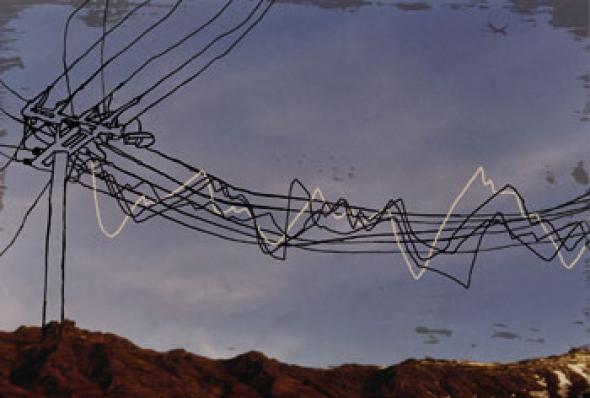Composing Ourselves
Radical 70s music theorist Jacques Attali came to London looking to reinvigorate debate around his theory of ‘composition’. Flint Michigan thinks it’s more debatable than ever.
As the author of one of the most provocative works of music theory, one that attempts to rescue music from the throes of its de-politicisation, Jacques Attali’s recent reappearance in London fell a long way short of expectations. Going by the edited transcript of Attali’s ICA talk in Wire magazine No.129, Attali’s ideas, first presented in his 1975 book Noise: The Political Economy of Music, remain undeveloped and lacking in self-criticism. In many ways his ‘political economy of music’ awaits its critique for, as it stands, many of his more radical notions have been undermined by his offers to manage cultural dissent. An offer which has landed him work with the European Bank for Reconstruction and Development and which is reflected in the ambivalence of statements such as: ‘Organising noises, creating differences in noises, is a way of demonstrating that violence can be transformed into a way of managing violence.’ <1> Does his reappearance on the circuit some 25 years after the book’s publication, the photos that adorn the Wire article, and his failure to acknowledge the intellectual milieu that gave rise to his book (Baudrillard on the ‘political economy of the sign’ and Enzenburger’s Constituents of a Theory of the Media, etc.) not suggest that once again we are in the presence of a Public Intellectual? Is he yet another one touting his ‘discourse-object’ to a public raised on the pacifying format of the seminar? One aspect of his book’s appeal, as with Baudrillard’s work, is his claim to have surpassed the political economy of Marx. Whilst such an endeavour is necessary for getting to grips with an acculturated capital, it is also more often used as a demonstration of intellectual might.
That said, Attali’s key concept, that of ‘composing’, is itself surely a reworking of Marx’s idea, buried in the Grundrisse, of ‘really free working e.g. composition’. This indebtedness to Marx may explain why Attali uses the term ‘composing’ when what he describes has always struck me as lying closer to ‘improvising’: ‘Beyond the rupture of the economic conditions of music, composition is revealed as the demand for the truly different system of organisation, a network within which a different kind of music and different social relations can arise. A music produced by each individual for himself, for pleasure outside meaning, usage and exchange.’ <2>
One of the difficulties with Public Intellectuals such as Attali is that once they have theorised their ‘beyond’, they can’t find the collective subjects to propel the social change that they apparently desire. But whereas Baudrillard, in the early ’70s, urged ‘symbolic transgression’ as a counter to the enforced diversification of the working class, at least Attali has the more concrete notion of the antagonistic musician in mind – an idea of the musician pegged to the movement of economic history and its changing codes. But as the quote above testifies, his notion of ‘composing’ is seriously problematic. What does this ‘individual pleasure’ signify, what ‘code’ does it uphold? At one point in Noise, perhaps lost for words, Attali offers it up as ‘egoistic enjoyment’ and, with that, the dim outline of a collective subject seems to disappear from our view.
So, the radical potential of Attali’s ‘composing’, whose bass-line is the reappropriation of our time and labour from the capitalist process of exchange-value, is negated by what Baudrillard calls the ‘private individual as productive force’ in which it is implicated. For me this explains why Attali has difficulty developing ‘composition’ beyond those individualist dimensions that are of prime importance to the music industry. For ‘pleasure outside meaning’, which abandons the construction of new meaning, simply reaffirms the capitalist paradigm founded on the relation between the individual and pleasure. The exploration of this relation, which marks the subversive impact of improvisation, is also one that reaffirms music as a commodity, a reified relation that submerges the social relations improvising can bring to the fore. So, as a ‘new’ concept of political economy, ‘composition’, as Attali leaves it, becomes readily assimilable to the ‘individualist productive force’ of the music industry. As egoistic enjoyment it can once more act as a sublimator of violence: ‘We can explore these different forms of organisation [of music] much more easily, much more rapidly, than we can explore different ways of organising reality.’ <3>
For ‘composition’ to work critically, as an antagonistic practice, the ‘network’ of which Attali speaks needs to be something more than a simple homologue of the network of political economy already monitored by the music industry. For its social relation to be something more than an exchange of discourse-objects, then maybe, with a nod to Attali, we should make a music without instruments, compose our own social relation and use the resultant music to ‘explore different ways of organising reality’. The critique of Attali’s political economy is a practice of collective subjects.
Flint Michigan
<1> Jacques Attali: ‘Ether Talk’, Wire, No.209, July 2001. Is this not another way of saying that music can be used to manage antagonism?
<2> Jacques Attali: Noise - The Political Economy Of Music (1975), Manchester University Press, 1985, p. 137
<3> Jacques Attali: ‘Ether Talk’, Wire, No.209
Jacques Attali, Noise: the Political Economy of Music // University of Minnesota Press, 1985 // isbn 0816612870
Mute Books Orders
For Mute Books distribution contact Anagram Books
contact@anagrambooks.com
For online purchases visit anagrambooks.com








